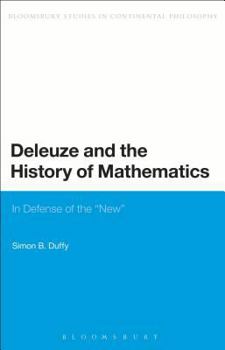Deleuze and the History of Mathematics: In Defense of the 'New'
Select Format
Select Condition 
Book Overview
Gilles Deleuze's engagements with mathematics, replete in his work, rely upon the construction of alternative lineages in the history of mathematics, which challenge some of the self imposed limits that regulate the canonical concepts of the discipline. For Deleuze, these challenges provide an opportunity to reconfigure particular philosophical problems - for example, the problem of individuation - and to develop new concepts in response to them. The highly original research presented in this book explores the mathematical construction of Deleuze's philosophy, as well as addressing the undervalued and often neglected question of the mathematical thinkers who influenced his work.
In the wake of Alain Badiou's recent and seemingly devastating attack on the way the relation between mathematics and philosophy is configured in Deleuze's work, Simon B.Duffy offers a robust defence of the structure of Deleuze's philosophy and, in particular, the adequacy of the mathematical problems used in its construction. By reconciling Badiou and Deleuze's seemingly incompatible engagements with mathematics, Duffy succeeds in presenting a solid foundation for Deleuze's philosophy, rebuffing the recent challenges against it.Format:Paperback
Language:English
ISBN:1472591348
ISBN13:9781472591340
Release Date:November 2014
Publisher:Bloomsbury Academic
Length:224 Pages
Weight:0.75 lbs.
Dimensions:0.5" x 6.1" x 9.1"
Related Subjects
PhilosophyCustomer Reviews
0 rating





